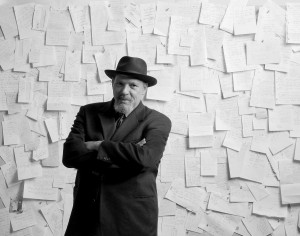I love how Stephen King, in On Writing (which you MUST read if you haven’t already), talks about the writing process as one of discovery, comparing it to an archaeologist finding just a bit of uncovered artifact in the dirt and then painstakingly sweeping away debris, not knowing what might lie underneath.
And then story emerges.
At a theater conference in Alaska several years ago, I had the privilege of hearing the acclaimed playwright, August Wilson, talk about the origins for his Pulitzer Prize winning play, Piano Lesson. He said it started with a line that came to him–“Old Sutter fell down a well.” Wilson didn’t know who was speaking, didn’t know who Sutter was, and certainly didn’t know if he was a victim of accident or murder. These were the questions that drove Wilson to discover Boy Willie and Berniece and their rich family history and the battles they fought against the ghosts of the past.
Here Wilson is against a backdrop of his discoveries–snippets of dialogue and questions and lists of character names scribbled on the backs of envelopes and scraps of paper as his stories emerged.

I was on the road from Nashville back home to Arkansas when Mouse came to me–a flash of a vision as I stared blankly out at the flatlands covered in defoliated rows of cotton. In my mind, I saw a girl, dressed as a monk, looking out over a massive medieval battlefield (she was watching one man in particular–I’ll tell you about him later), and I knew her name: Mouse. I didn’t know why she had such a strange name or what the battle was, when it was, or who was fighting.
It took more than a year for Mouse to tell me her story.
I confess I felt a bit odd having these silent conversations in my head. Me: You know, I can’t write a book about a character named “Mouse.” So what’s your real name? Mouse: Mouse is the only name I’ve ever had. Me: Why? Mouse (shrugging): No one bothered to give me another.
But then I remembered Wilson talking about his play Seven Guitars, which was supposed to be about these seven male musicians–a MAN’s play. Wilson had a fairly routine daily writing practice–into the studio early, writing at a podium, finishing a certain word count, leaving a thread of something (dialogue, middle of scene, etc.) to pick up and follow the next morning. Well one day, he walks into the studio and heads to the podium when the dudes in the play ask “What’s she doing here?” Wilson looks up and sees a woman with a chicken and a radio sitting there.
He’s as baffled as anyone and asks her, somewhat belligerently, “What are you doing here?”
She replies, “I want my own space.”
Wilson heads back to the podium and starts over. During the rewrite, he discovers that two more women have come to “claim space” in what becomes his self-defined “MAN-WOMAN play.” So much for the guys and all their manliness.
That’s a writer’s journey of discovery–painstakingly uncovering the threads of narrative even when (especially when) they lead us (sometimes trepidatiously, sometimes resentfully) to unexpected places and people and experiences.
A great model for writing–you’re along for the ride, NOT driving the bus–and for life, too, I think.
